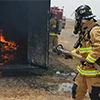2017 Teddy Awards: Honorable Mention
Fit for Duty

“Public safety folks are going to get injured.”
It’s a sobering but accurate assumption about the work of firefighters, police officials and sheriffs, as expressed by Ray Sibley, the director of Risk Management at The City and County of Denver.
It’s also been a great motivator … fueling a change of culture in the Public Safety Department at the council that led to a 48 percent in workers’ comp claims in only one year.
It has also earned the department an honorable mention in the 2017 Teddy Awards.
The reward acknowledges the introduction of a program that strives to prepare firefighters, sheriffs and police officials to face the physical demands of their jobs in a way that’s reminiscent of the conditioning undergone by professional football and basketball players.
Public safety staff, like athletes, face significant risk of injury. Prevention can go only so far in keeping the number of injuries down. Sibley said that risk management policies adopted over more than a decade by the Council have done a good job in reducing the number of injuries. In 2000, right after he took over the department, almost 1,900 injury-related workers’ comp claims were filed each year. In 2016, that figure was cut nearly in half.
But claims costs continued to rise nonetheless. Claims costs more than doubled from 2013 to 2015, going from $3.7 million to $7.9 million.
“We realized that the number of injuries dropped as low as it could go,” Sibley said. “So we decided to focus on reducing the severity of the injuries and the treatment required to bring folks back to work.”
The decision has paid dividends already. In 2016, the number of injuries once again remained fairly stable, but costs plunged to $4.1 million.
Tailored Training
One effective measure was the implementation of a physical therapy program which aims to help firefighters, police officials and sheriffs condition their bodies to the specific demands of their jobs.
Therapists are available at the respective academies to work with current staff and to guide new recruits from the beginning of their careers on how to stay fit to perform their demanding jobs.
“The goal is to help them maintain their physical abilities to reduce the impact of minor injuries,” Sibley pointed out. He draws a comparison with professional athletes, who work their bodies out according to the sports they play, and therefore are better prepared to deal with any injuries they may suffer during a game.
“When they have an injury, it doesn’t take them six months to recover,” he said. “It takes them a week or two.”
Public safety staff are subject to levels of physical demand similar to athletes when, for instance, they are called to an emergency. Take the case of firefighters, who need to carry a 60-pound SCBA apparatus upon their shoulders when there is a fire. If they do not strengthen their shoulders to do that, it’s easy to get injured while simply getting ready to answer to the call of duty.
Experts identified the critical functional movements for each group and tailored exercise routines to improve the physical ability of each department. “In the rush, when the fire bell goes off, they will throw the pack over their shoulders and not get hurt by doing it, because their bodies are used to doing that movement,” Sibley said.
Public safety workers who do get hurt are now getting back to work quicker than in previous years, reducing the need for the council to pay extra time for the professionals called to fill vacant spots.
“In the rush, when the fire bell goes off, they will throw the pack over their shoulders and not get hurt by doing it, because their bodies are used to doing that movement,” — Ray Sibley, director of risk management, The City and County of Denver
The conditioning program was piloted with firefighters four years ago and has since expanded to the police and sheriff’s departments.
Sibley said that it took a while for staff members to really buy into the new ideas, but they began to embrace the program once the benefits for their personal lifestyles become evident.
The physical therapy program complements other initiatives that focus on proactive ways to help employees to take responsibility for their well-being while performing their daily activities, both at work and at home.
They include training in subjects such as defensive driving and ergonomics and the implementation of a Functional Movement Screening system that produces personalized exercise regimes for employees, according to their daily routines.
The Department has also adopted policies to increase the efficiency of the handling of workers’ comp claims, such as the replacement of a paper-based system by a telephone-based one, and the hiring of two nurses to serve as a first point of contact for injured workers.
The next step, said Sibley, is to focus on mental health. Firefighters, police officials and sheriffs need appropriate support while performing jobs that necessarily involve high levels of stress.
“We want them to enjoy a good life once they retire, after providing us services for decades,” he said. &
_______________________________________________________
More coverage of the 2017 Teddy Award Winners and Honorable Mentions:
 Advocacy Takes Off: At Delta Air Lines, putting employees first is the right thing to do, for employees and employer alike.
Advocacy Takes Off: At Delta Air Lines, putting employees first is the right thing to do, for employees and employer alike.
 Proactive Approach to Employee Safety: The Valley Health System shifted its philosophy on workers’ compensation, putting employee and patient safety at the forefront.
Proactive Approach to Employee Safety: The Valley Health System shifted its philosophy on workers’ compensation, putting employee and patient safety at the forefront.
 Getting It Right: Better coordination of workers’ compensation risk management spelled success for the Massachusetts Port Authority.
Getting It Right: Better coordination of workers’ compensation risk management spelled success for the Massachusetts Port Authority.
 Carrots: Not Sticks: At Rochester Regional Health, the workers’ comp and safety team champion employee engagement and positive reinforcement.
Carrots: Not Sticks: At Rochester Regional Health, the workers’ comp and safety team champion employee engagement and positive reinforcement.
 Fit for Duty: Recognizing parallels between athletes and public safety officials, the city of Denver made tailored fitness training part of its safety plan.
Fit for Duty: Recognizing parallels between athletes and public safety officials, the city of Denver made tailored fitness training part of its safety plan.
 Triage, Transparency and Teamwork: When the City of Surprise, Ariz. got proactive about reining in its claims, it also took steps to get employees engaged in making things better for everyone.
Triage, Transparency and Teamwork: When the City of Surprise, Ariz. got proactive about reining in its claims, it also took steps to get employees engaged in making things better for everyone.
 A Lesson in Leadership: Shared responsibility, data analysis and a commitment to employees are the hallmarks of Benco Dental’s workers’ comp program.
A Lesson in Leadership: Shared responsibility, data analysis and a commitment to employees are the hallmarks of Benco Dental’s workers’ comp program.











